 Fair Use/Fair Dealing Week, celebrated by academic and cultural institutions around the world, is scheduled for February 24–28. No matter how you choose to participate, the event provides an opportunity to reflect on the value of fair use laws for virtually everyone in society, even for individuals uninterested in copyright law.
Fair Use/Fair Dealing Week, celebrated by academic and cultural institutions around the world, is scheduled for February 24–28. No matter how you choose to participate, the event provides an opportunity to reflect on the value of fair use laws for virtually everyone in society, even for individuals uninterested in copyright law.
Fair use gives content creators limited control over the use of their creations. In practice, this means work can be critiqued, parodied, or dissected. Books can be quoted. Art and media can build upon existing concepts and works to enrich the culture. Information can be indexed and digitized. New software can read older file formats. Copyright laws can more reasonably adapt to new technology, and individuals can exercise their freedom of speech.
Essentially, fair use is vital for the continued functioning of culture, education, news, and scholarship around the world. Fair use, as it is referred to in the United States, is known as “fair dealing” in Canada. Other countries around the world have also implemented fair use laws. On a global level, fair use means that scholars, scientists, and students can study and share information without fear of penalty or repercussion. At the Center for Global Studies, fair use Is essential to our mission to “promote and support innovative research to better understand global issues confronting the world’s populations and identify ways to cope with and resolve these challenges.”
Want to learn more? Take a look at the Fair Use/Fair Dealing Week website, maintained by the Association of Research Libraries (ARL). For information about the role of fair use in academic work, check the University Library’s Copyright Reference Guide.



Comments are closed.